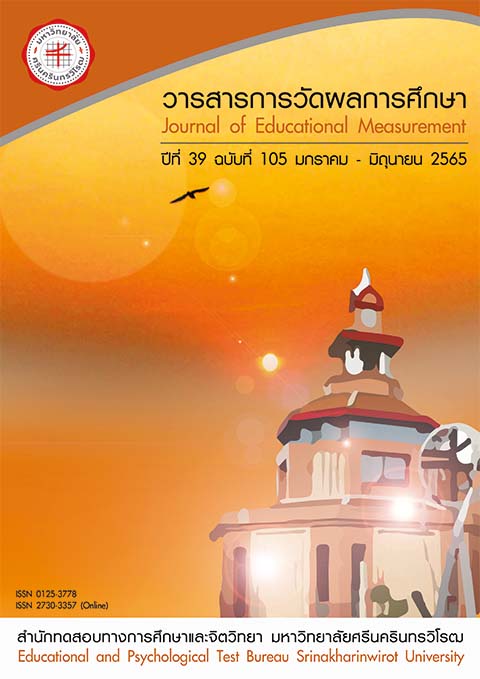อิทธิพลเชิงสาเหตุของปัจจัยที่มีต่อสุขภาวะเชิงอัตวิสัยและความเหนื่อยหน่ายในงาน ของครู ศูนย์การศึกษาพิเศษ
คำสำคัญ:
ความสอดคล้องระหว่างบุคคลกับองค์กร, สุขภาวะเชิงอัตวิสัย, ความเหนื่อยหน่ายในงาน, ทุนทางจิตวิทยา, การรับรู้การสนับสนุนจากองค์กรบทคัดย่อ
วัตถุประสงค์ของการวิจัยเชิงสำรวจเพื่อ 1) ตรวจสอบความสอดคล้องของรูปแบบอิทธิพลเชิงสาเหตุของปัจจัยที่มีต่อสุขภาวะเชิงอัตวิสัยและความเหนื่อยหน่ายในงานกับข้อมูลเชิงประจักษ์ และ 2) ศึกษาทิศทางและขนาดของอิทธิพลตัวแปรสาเหตุด้านทุนทางจิตวิทยาและการรับรู้การสนับสนุนจากองค์กร และความสอดคล้องระหว่างบุคคลกับองค์กรที่มีต่อสุขภาวะเชิงอัตวิสัยและความเหนื่อยหน่ายในงานของครูศูนย์การศึกษาพิเศษ กลุ่มตัวอย่างจำนวน 280 คน ใช้แบบสอบถามเก็บรวบรวมข้อมูล ใช้การวิเคราะห์โมเดลสมการโครงสร้าง (SEM) ผลการศึกษาพบว่า 1) โมเดลสมการโครงสร้างอิทธิพลเชิงสาเหตุฯ มีความสอดคล้องกับข้อมูลเชิงประจักษ์ โดยมีดัชนีความกลมกลืนสัมบูรณ์ที่แสดงความสอดคล้อง ได้แก่ Chi-square/df = 1.65, GFI = .95, AGFI = .92, SRMR = .041, RMSEA = .048 ซึ่งผ่านเกณฑ์ มีดัชนีความกลมกลืนเชิงเปรียบเทียบ NFI = .98, IFI = .99, CFI = .99 ซึ่งผ่านเกณฑ์ และดัชนีระบุขนาดของกลุ่มตัวอย่าง CN = 244.61 ซึ่งผ่านเกณฑ์ และ 2) อิทธิพลเชิงสาเหตุพบว่า ทุนทางจิตวิทยามีอิทธิพลทางตรงเชิงบวกต่อความสอดคล้องระหว่างบุคคลกับองค์กรอยู่ที่ .40 มีอิทธิพลรวมเชิงบวกต่อสุขภาวะเชิงอัตวิสัยอยู่ที่ .88 และมีอิทธิพลรวมเชิงบวกต่อความเหนื่อยหน่ายในงานอยู่ที่ -.25 (p < .05) การรับรู้การสนับสนุนจากองค์กรมีอิทธิพลทางตรงเชิงบวกต่อความเหนื่อยหน่ายในงานอยู่ที่ .30 และมีอิทธิพลรวมเชิงบวกอยู่ที่ .24 (p < .05) และความสอดคล้องระหว่างบุคคลกับองค์กรมีอิทธิพลทางตรงเชิงลบต่อความเหนื่อยหน่ายในงานอยู่ที่ -.63 (p < .05)
เอกสารอ้างอิง
ขวัญธิดา พิมพการ, กฤษฎา ทองทับ และวรรณา จำปาทิพย์. (2564). การศึกษาปัจจัยคุณภาพชีวิตในการทำงานที่ส่งผลต่อความผูกพันต่อองค์กรของพนักงานบริษัทในกลุ่มผู้ผลิตพลาสติก. วารสารนวัตกรรมการศึกษา, 38(103), 171-183.
ชนิดา แก้วดี. (2558). สภาพการดำเนินงานของการศึกษาของศูนย์การศึกษาพิเศษ เขตการศึกษา 12 จังหวัดชลบุรี. วิทยานิพนธ์ปริญญามหาบัณฑิต. ชลบุรี: มหาวิทยาลัยบูรพา.
ชาญชัย รัตนปราการ. (2555). ผลของการสร้างความได้เปรียบในการแข่งขันทางธุรกิจต่อพฤติกรรมการบริโภคที่เกินพอเพียง. ปริญญานิพนธ์ปริญญาดุษฎีบัณฑิต. กรุงเทพฯ: มหาวิทยาลัยธุรกิจบัณฑิต.
สถาบันราชานุกูล กรมสุขภาพจิต. (ม.ป.ป.). การจัดการเรียนการสอนสำหรับเด็กที่มีความต้องการพิเศษ. กรุงเทพฯ: ม.ป.พ.
สุริย์วิภา ไชยพันธุ์. (2564). ความสัมพันธ์ระหว่างสมรรถนะของผู้ปฏิบัติงานกับคุณภาพการให้บริการขององค์การรัฐและเอกชนในเขตกรุงเทพมหานคร. วารสารวัดผลการศึกษา, 38(104), 209-220.
อรุณศรี เทวโรทร, ชนมณี ศิลานุกิจ และรัตนา กาญจนพันธุ์. (2562). ความคิดเห็นของครูที่มีต่อการบริหารงานวิชาการของผู้บริหารโรงเรียนขยายโอกาสทางการศึกษา สำนักงานเขตพื้นที่การศึกษาประถมศึกษา ปทุมธานี เขต 2. วารสารการวัดผลการศึกษา, 36(100), 48-61.
Afsa, B., & Badir, Y. F. (2016). Person-ognization fit, perceived organizational support and organizational citizenship behavior: The role of job embeddedness. Journal of human resources in hospitality & tourism, 15(3), 252-278.
Akhtar, M. W., Syed, F., Husnain, M., & Naseer, S. (2019). Person-organization fit and innovative work behavior: The mediating role of perceived organizational support, affective commitment and trust. Pakistan Journal of Commerce and Social Science, 13(2), 311-333.
Andela. M., & Doef. M. (2019). A Comprehensive Assesment of the Person-innovative Environment Fit Dimension Their Relationships With Work-Related Outcome. Jounal of Career Development, 2, 309-328.
Cable, D. M., & Parsons, C. K. (2001). Socialization tactics and person-organization fit. Personal Psychology, 54, 1-23.
Chung, Y. W. (2017). The role of person-organization fit and perceived organizational support in the relationship between workplace ostracism and behavioral outcome. Australian Journal of Management, 42(2), 328-349.
El-Sakka, N. (2016). The relationship between person-organization fit, burnout and turn over intention among CIC academic staff. The Business and Management Review, 7, 53-67.
Ferradás, M., Freire, C., García-Bértoa, A., Núñez, J., & Rodríguez, S. (2019). Teacher Profiles of Psychological Capital and Their Relationship with Burnout. Sustainability, 11. Retrieved from https://www.mdpi.com/2071-1050/11/18/5096.
Jebb, A. T., Morrison, M., Tay, L.& Diener, A. (2019). Subjective well-being around the world: Trends and predictors across the life span. Manuscript under review for Psychological Science, 1-33.
Joo, B. K., & Lee, I. (2017). Workplace Happiness: work engagement, career satisfaction and subjective well-being. Evidence-based HRM: A Global Forum for Empirical Scholarship, 5(2), 206-221.
Kawalya, C., Munene, J. C., Ntayi, J., Kagaari, J., Mafabi, S., & Kasekende, F. (2019). Psychological capital and happiness at the workplace: The mediating role of flow experience. Cogent Business and Management, 6, 1-13.
Kline. (2011). Principles and practice of structural equation modeling. New York: The Guilford Pres.
Larson, Chastain, R., Hoyt, W. T., & Ayzenberg, R. (2015). Self-Concealment: Integrative Review and Working Model. Journal of Social and Clinical Psychology, 34(8), 705-774.
Maslach, C., Schaufeli, W., B,. , & Leiter, M., P. . (2001). Job burnout. Annual review of psychology, 52. 397-422.
Nelson, D. L., & Cooper, C. L. (2007). Positive Organizational behavior. London: Sage publications.
Putra, Y. S. (2018). Peran Psychological capital dan Person-Organization Fit terhadap kesiapan I-generations untuk berubah. Among Makarti, 11(21), 84-99.
Schumacker, R. E., & Lomax, R. G. (2001). A Beginner's Guide to Structural Equation Modeling. Routledge.
Shier, M. L., & Graham, J. R. (2010). Work-related and factors that impact social work practitioners’ subjective well-being: Well-being in the workplace. Journal of Social Work, 11(4), 402-421.
Siegall, M., & McDonald, T. (2014). Person-organization value congruence, burnout and diversion of resources. Emerald Group Publishing Limited, 33(3), 291-230.
Zhu, Q., Zhang, M., & Zeng, D. (2019). Research on the relationship between person-organization fit, psychological capital and work engagement. International Conference on Management. 487-491.



